Femia > Health Library > Pregnancy > Pregnancy health > Chemical pregnancy symptoms: What to know about this early loss
Chemical pregnancy symptoms: What to know about this early loss
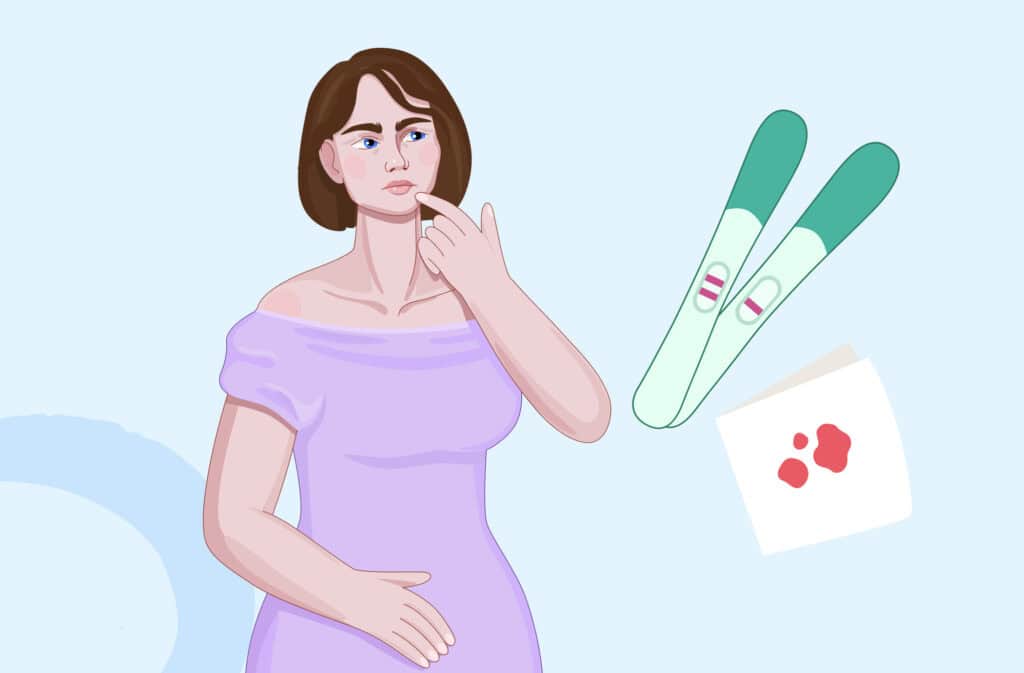
- Updated Mar 1, 2025
- Published
CRAFTED BY HUMAN
Crafted by human At Femia, we provide accurate and up-to-date information at every stage of your journey, from trying to conceive, pregnancy and postnatal support. All content is created by a real person based on in-depth research and own professional experience. Femia ensures that you will receive expert advice, strict accuracy and a personalized approach from our authors/medical experts. Learn more about our editorial policy.
FACT CHECKED
Fact checked At Femia Health, we maintain the highest standards of editorial excellence in delivering content focused on helping you conceive, guiding you through pregnancy, and supporting you postpartum. Explore our content review principles to learn how we ensure the accuracy and quality of our health and lifestyle tips for every stage of your journey.
- A chemical pregnancy is a very early miscarriage, typically occurring within the first five weeks of pregnancy, often before a woman knows she’s pregnant.
- Symptoms can include mild cramping, spotting, a heavier-than-usual period, and a positive pregnancy test followed by a negative test or period.
- Chemical pregnancies are common (approx 10–20% of known pregnancies) and usually don’t require medical treatment, but recurring losses may warrant further evaluation by a healthcare provider.
Have you ever received an awaited positive on a pregnancy test, then got your period or a negative result a few weeks later? Or, have you suspected that you might be pregnant only to have a heavier-than-normal period soon after? Both cases might be a sign that you’ve had a chemical pregnancy—a form of a very early pregnancy loss.
Although it happens rather frequently, it can be an incredibly frustrating and emotional time. To help you recognize the signs and be equipped with the right knowledge to get through this early loss, we’ve prepared a thorough guide on chemical pregnancy symptoms, commonness, causes, distinctive features, and recommendations on when to seek medical help.
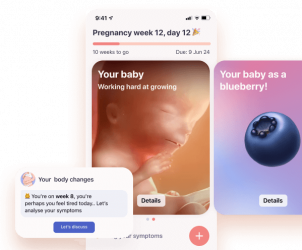
What is a chemical pregnancy?
A chemical pregnancy is a very early miscarriage that occurs within the first few weeks of pregnancy.
In a chemical pregnancy, an embryo forms and implants into the uterine lining, but then its development stops—for example, due to an issue with implanting or an embryo’s genetic makeup. The halt of the embryo’s development triggers the cessation of human chorionic gonadotropin (hCG) production, which means that the pregnancy can’t be maintained anymore.
This form of miscarriage takes place very early into the gestational period, typically within the first five weeks, before a woman even realizes she’s pregnant.
A chemical pregnancy is also known as a biochemical pregnancy.
How common are chemical pregnancies?
Around 10% to 20% of known pregnancies end in miscarriage within the first 20 weeks.
About 80% of these miscarriages actually happen very early and might be called chemical pregnancies.
Nevertheless, determining the exact rate of biochemical pregnancies is hard because, due to how early it happens, many women don’t know they’re pregnant when they have one. This happens not only because it might be too early to notice any common early pregnancy signs, but also because they. tend to have rather heavy and painful periods, which makes it easy to mistake chemical pregnancy symptoms for regular menstruation.
What causes a chemical pregnancy?
The exact cause of each particular chemical pregnancy is hard to identify since it happens so early, which makes it barely possible to detect any fetal or maternal issues.
The two possible causes include:
- Problems with the embryo’s chromosomes. Chromosomes are blocks of DNA that contain instructions for your baby’s development. If there are any issues in the embryo’s chromosomes, it can’t develop properly, and the pregnancy ends almost instantly.
- Problems with the womb lining development. When the lining of the womb fails to develop in time, an embryo may not be able to implant properly, which makes it impossible for it to be maintained.
Regardless of the reason, when the embryo’s development stops, your body stops developing hCG hormone to maintain the pregnancy. As a result, the pregnancy stops, and an early miscarriage occurs.
Chemical pregnancies are unpredictable, and there is usually nothing you can do to prevent one. However, there are a few factors that can put you at a higher risk:
- Maternal age of 35 or older (due to the decreasing quality of an egg);
- An untreated blood-clotting disorder,
- An atypically shaped uterus,
- Hormonal imbalances,
- Uncontrolled diabetes,
- A sexually transmitted infection (STI),
- An untreated thyroid disorder,
- Polycystic ovarian syndrome (PCOS).
👉Find out more: Which food can cause miscarriage: A comprehensive guide
Do you have symptoms with a chemical pregnancy?
Now that you know what it is and how commonly it happens, you might be wondering how to tell if you’re dealing with a chemical pregnancy.
So, what are chemical pregnancy symptoms to watch out for? The most common signs include:
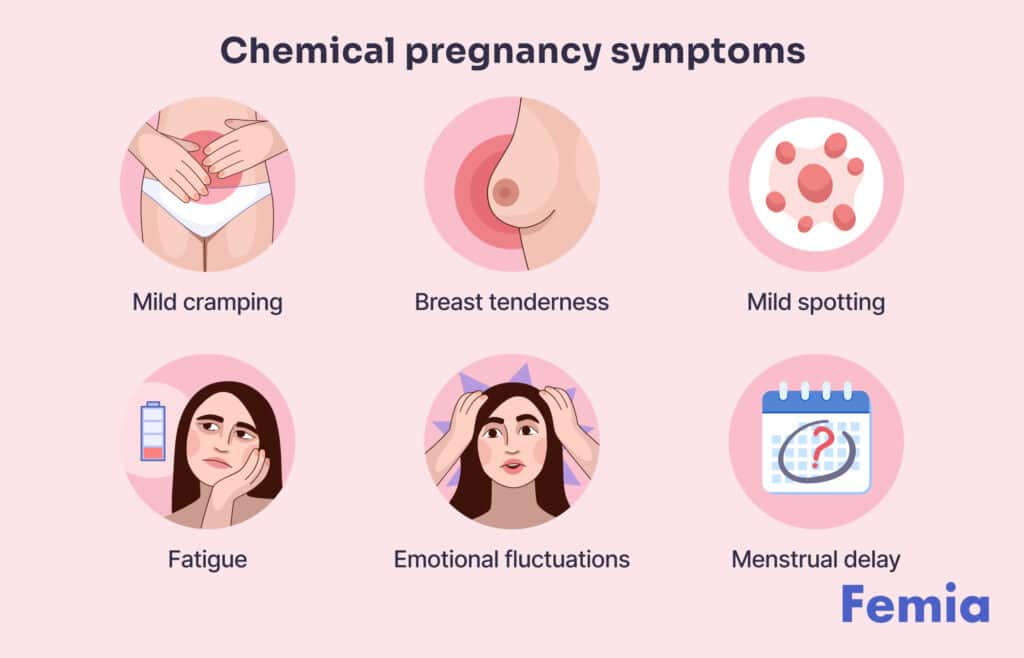
- Mild cramping,
- Breast tenderness,
- Mild spotting,
- Fatigue,
- Emotional fluctuations,
- Menstrual delay.
These symptoms may resemble early pregnancy signs, which can make them harder to detect. Also, they may vary in severity from one female to another.
Chemical pregnancy symptoms at 5 weeks
If you’re experiencing a chemical pregnancy at 5 weeks, you might already know you’re pregnant; most women have missed their periods and gotten a positive test result by this time.
Here are some chemical pregnancy symptoms at 5 weeks to keep in mind:
- Experiencing mild cramps out of the blue.
- Experiencing heavier bleeding with small blood clots.
- Noticing changes in your test results.
Do you have pregnancy symptoms with a chemical pregnancy? The answer might be “yes” if your miscarriage happens around the fifth week. Common early pregnancy signs at this time can include sore breasts, bloating, nausea, food cravings, etc. Hence, if you encounter a chemical pregnancy at 5 weeks, one of the signs might be a loss of early pregnancy symptoms that you’ve already started experiencing.
Chemical pregnancy symptoms before a missed period
If you haven’t missed your period yet, spotting a chemical pregnancy might be harder, because many women don’t even know they’re pregnant at this stage.
Here are some chemical pregnancy symptoms before a missed period to keep an eye on:
- You experience spotting outside of your periods.
- Your period is heavier and more painful than usual.
- Your period arrives later than usual.
- You already have a positive pregnancy test result but then get your period at the expected time.
- You take a test and see a very faint positive line.
👉Find out more: Period vs. miscarriage: How to tell the difference
Chemical pregnancy vs. early miscarriage
A chemical pregnancy is a form of early miscarriage, so they have some similar traits.
The typical symptoms for both types of loss include vaginal spotting or bleeding, painful sensations, passage of tissue from the vagina, etc. Both an early miscarriage and a chemical pregnancy are often unpredictable and happen due to an abnormal number of chromosomes in an embryo.
On the other hand, there are several factors that distinguish these two terms. First of all, it’s timing—an early pregnancy loss is considered a miscarriage that takes place before 13 weeks. A chemical pregnancy is a pregnancy loss that happens within the first five.
Another difference is that a chemical pregnancy happens so early that many women don’t realize they’re pregnant yet, whereas an early pregnancy loss typically happens when you already know you’re pregnant, which is why its symptoms are hard to mistake for a regular period.
Also, unlike a chemical pregnancy, an early miscarriage might require treatment. Depending on the term, you may have some pregnancy tissue left inside your uterus after miscarriage that needs to be removed.
How is a chemical pregnancy diagnosed?
A healthcare provider can detect a chemical pregnancy via one of the following methods:
- A pregnancy blood test may reveal that you’re not pregnant.
- A blood test targeting the hCG level can help first diagnose pregnancy and then demonstrate a chemical pregnancy if its level drops on the second test.
- An ultrasound screening can show that there’s no fetus developing and confirm a chemical pregnancy.
How are chemical pregnancies treated?
A chemical pregnancy usually doesn’t require treatment.
If it’s a one-off occurrence, dealing with this form of an early miscarriage doesn’t mean an inability to carry a baby to term. Many females go on to have successful pregnancies after it, so the chances of successful conception are retained. However, if you experience recurring chemical pregnancies, your healthcare provider may refer you to a fertility specialist.
Although there is typically no need for physical treatment, it doesn’t mean that you don’t need help processing your loss. Everyone experiences a chemical pregnancy differently. If you already know you’re pregnant, especially if you’ve been planning pregnancy for a while, dealing with such an early loss may feel devastating. In this case, you might want to speak to someone who can help you process the loss and recover.
If you haven’t been planning a pregnancy or aren’t ready for it yet, facing a chemical pregnancy can make you feel relief or not feel any way about it at all. Whatever feelings you may experience, remember that it’s okay, and choose to act based on your unique needs.
When to seek medical attention
A chemical pregnancy usually doesn’t require medical intervention. It’s normal to notice a more painful or heavy period than usual, occasionally with some small blood clots, so there is no need to worry if you experience these and other mild chemical pregnancy symptoms.
Meeting a doctor might be needed only if you experience severe symptoms, like acute pain or very heavy bleeding. You may also want to seek personalized advice if you’re planning a pregnancy.
It can be helpful to ask your healthcare provider how long you may need to wait before future conception attempts, whether you need to take any tests to reveal underlying issues that might affect your pregnancy, and what lifestyle changes you can make to improve your chances of a healthy pregnancy.
with confidence

Questions from the Femia community
Can I have a chemical pregnancy and not know it?
Yes; it’s not uncommon for women to not know they’ve had a chemical pregnancy. Due to similar symptoms and how early in the term they happen, a chemical pregnancy can be mistaken for a regular period, especially if you haven’t planned a pregnancy in the first place.
How soon after a chemical pregnancy can I try to conceive again?
Usually, you can try to conceive after your next regular cycle. However, it’s always a good idea to see your healthcare provider for personalized guidance, as it can help determine potential risks and increase the likelihood of pregnancy.
👉Find out more: Sex after miscarriage: When is it safe to resume intimacy?
Do chemical pregnancies increase the risk of future miscarriages?
A single chemical pregnancy typically doesn’t affect your ability to carry a baby to term and doesn’t increase the risk of future miscarriages. However, if you’ve had recurring chemical pregnancies, you may need further medical evaluation and guidance from a fertility specialist.
The bottom line
A chemical pregnancy is a rather common event that’s impossible to predict and often hard to detect, since it happens so early into a pregnancy. Whether you are or aren’t planning a pregnancy, understanding the common chemical pregnancy symptoms is important for understanding your reproductive health and being able to notice the changes that happen in your body and address them accordingly.
Use the knowledge from this guide to recognize the signs of a chemical pregnancy. And, don’t forget about the importance of seeking medical advice for maintaining your health after a chemical pregnancy and boosting the likelihood of successful future pregnancies.
References
- “What Is a Chemical Pregnancy?” Penn Medicine, Lancaster General Health. https://www.lancastergeneralhealth.org/health-hub-home/motherhood/getting-pregnant/what-is-a-chemical-pregnancy.
- Betz D, Fane K. “Human Chorionic Gonadotropin.” StatPearls, Jan. 2024. https://www.ncbi.nlm.nih.gov/books/NBK532950/#:~:text=Human%20chorionic%20gonadotropin%20is%20a,the%20liver%2C%20and%20the%20colon.
- “Miscarriage.” Mayo Clinic, 8, Sept. 2023. https://www.mayoclinic.org/diseases-conditions/pregnancy-loss-miscarriage/symptoms-causes/syc-20354298.
- “Chemical pregnancy.” Tommy’s, 14, Feb. 2024. https://www.tommys.org/baby-loss-support/miscarriage-information-and-support/types-of-miscarriage/chemical-pregnancy-information-and-support.
- “Week 5.” The National Health Service (NHS). https://www.nhs.uk/start-for-life/pregnancy/week-by-week-guide-to-pregnancy/1st-trimester/week-5/#:~:text=Your%20baby’s%20nervous%20system%20is,a%20bit%20under%20the%20weather.
- “What Does Very Faint Line on a Pregnancy Test Mean?” Eternal Hospital, 6, Apr. 2024. https://www.eternalhospital.com/title/what-does-very-faint-line-on-a-pregnancy-test-mean.
- “Early Pregnancy Loss.” The American College of Obstetricians and Gynecologists (ACOG). https://www.acog.org/womens-health/faqs/early-pregnancy-loss.
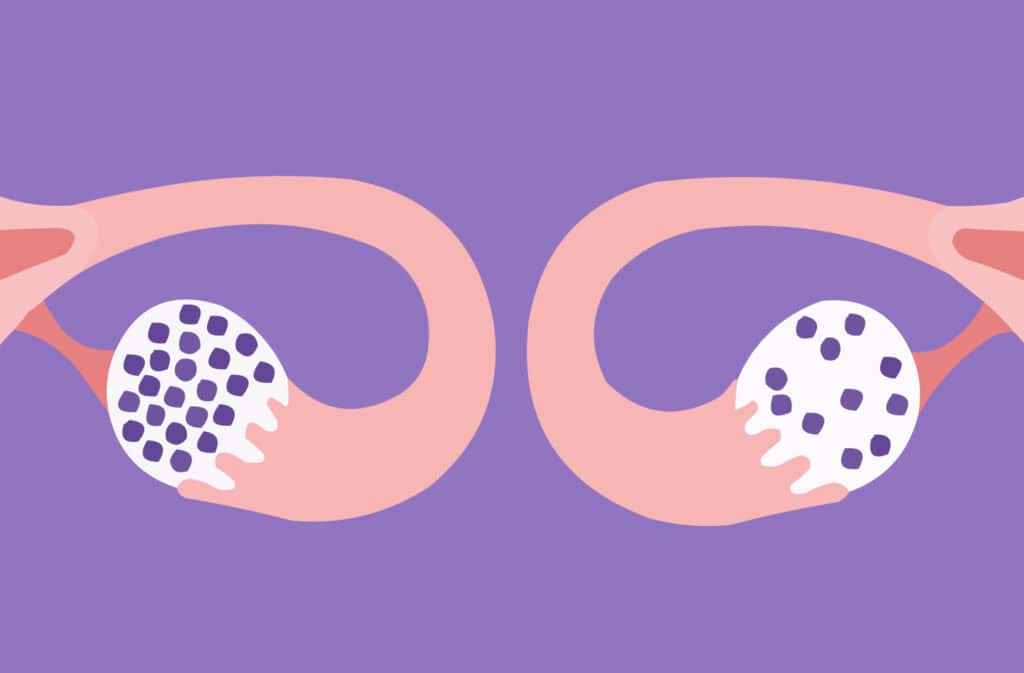
How many eggs do women have and how does their amount change with age? Here is a guide to help you get a better understanding of your fertility.
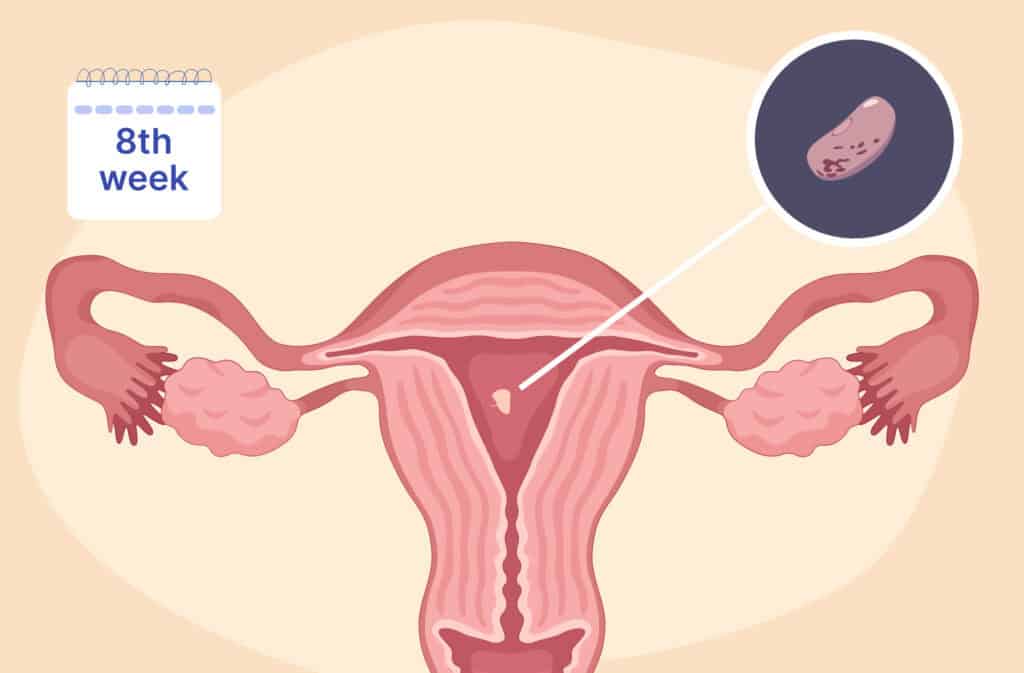
Discover what’s happening at 8 weeks pregnant, from baby’s first movements to new symptoms. Get tips for a healthy pregnancy and self-care ideas.

What are the risks and benefits of period sex? Click to read the complete guide with all the information you need to know and tips for a comfortable experience!

